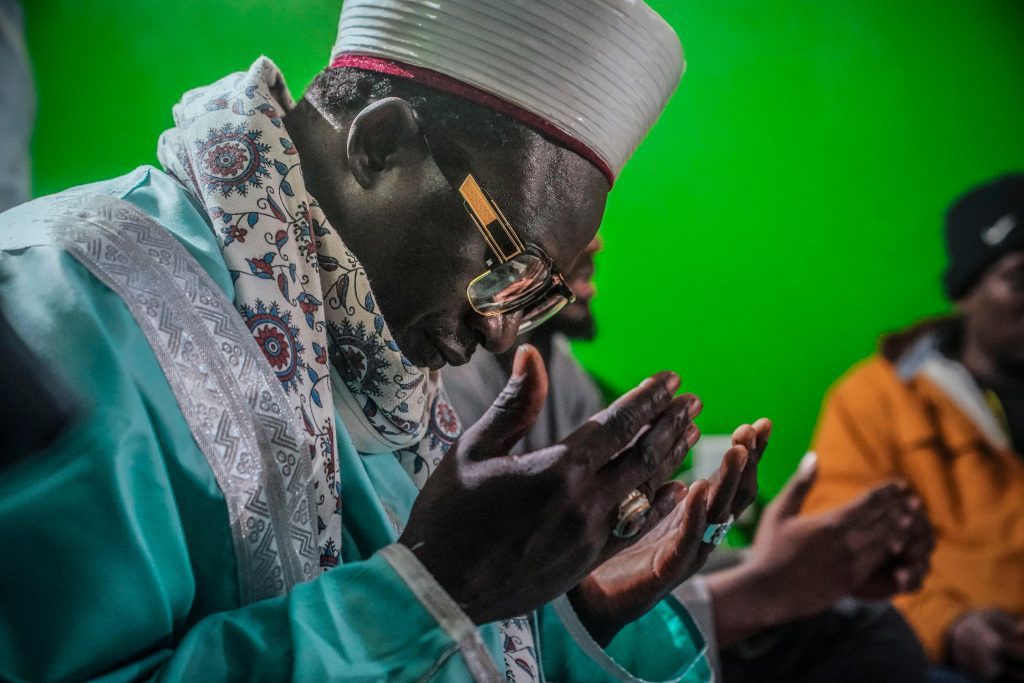By PHILIP MARCELO (Associated Press)
NEW YORK (AP) — A mosque in Harlem is hosting iftar, the traditional Islamic meal at the end of the fast, for hundreds of hungry migrants every night during Ramadan.
In the Bronx, an imam has turned his two-story brick residence into a temporary shelter for migrants, many of whom are men from Senegal.
Islamic institutions in New York City are struggling to meet the needs of the migrant population, especially as more asylum seekers from Muslim-majority African countries arrive during Ramadan.
Many mosques have opened their doors to migrants during the day, serving as day centers where new arrivals can rest and recover after sleeping on the streets or in the subway.
Muslim leaders have been asking for donations of money, food, clothing, and other supplies in recent days.
Moussa Sanogo, assistant imam at the Masjid Aqsa-Salam in Harlem, stated, “We’re doing what we can do, but we can’t do everything. That’s the bottom line. These brothers don’t eat enough. They’re starving when they get here. Can you imagine? Starving. In America.”
Imam Omar Niass, who runs Jamhiyatu Ansaru-Deen in the Bronx, said providing a place for newly arrived migrants to stay is the least he can do, even though it has come at a great personal expense.
His utility bills have exceeded his ability to pay, and he estimates he’s behind about $7,000 on the home’s electricity service and another $11,000 on water service.
“In our culture, you can’t deny the people who come to the mosque. We keep receiving them because they have nowhere to go. If they come, they stay. We do what we can to feed them, to help them.”
More than 185,000 asylum seekers have arrived in New York City since the spring of 2022, with Africans from majority Muslim nations such as Senegal, Guinea, and Mauritania among the top nationalities represented in new cases in federal immigration courts in the state.
According to Assefash Makonnen of African Communities Together, a Harlem-based advocacy group supporting African immigrants, New York City’s approximately 275 mosques were among the first places to be affected by the African wave, as they’re often the first stop for migrants arriving in the city.
However, relying solely on the generosity of faith-based communities, many of which are already struggling, isn’t sustainable in the long run, said Makonnen.
Last summer, Democratic Mayor Eric Adams announced a program meant to provide funding, security, and other support for up to 75 mosques, churches, and synagogues that agreed to provide overnight shelter to migrants.
Up to now, only six houses of worship with about 100 beds have been given permission to offer more space for the over 64,000 migrants currently housed in hotels and other shelters by the city.
Bishop Matthew Heyd of the Episcopal Diocese of New York explained that many faith-based institutions struggle because they are in older buildings that do not meet current fire safety standards.
He stated that with more sensible regulations, houses of worship are ready to provide 5,000 extra beds for migrants at a much lower cost than what the city is currently paying to shelter migrants in hotels across the five boroughs.
Heyd expressed the desire for faith-based institutions to be part of the solution, pointing out a network of faith-based shelters that was established in response to the city’s homeless crisis in the 1980s.
A spokesperson for Adams, Kayla Mamelak, mentioned that the city addressed the concerns by reducing the maximum number of beds permitted at faith-based shelters this year from 19 to 15, which means they would not be required to have sprinkler systems under city building codes.
“We are making changes where we can,” she said. “Obviously the health and safety of the people we are sheltering has to be the priority. You just can’t walk into a church and turn it into a shelter.”
In the Bronx, Niass said he hasn’t given the city program much thought. He also stressed he doesn’t collect rent from the migrants, in contrast to the illegal, dangerously overcrowded migrant boarding houses the city has shut down in recent weeks.
Still, the conditions at the mosque are less than ideal.
During a recent visit, men relaxed on the floor of a basement prayer room between the day’s five prayer times. More lounged in the backyard, where there was a microwave and hot water kettle for preparing basic meals, as well as a shed for storing luggage and a row of file cabinets for incoming mail. Near the driveway was a portable toilet covered in a blue tarp that did little to hide the odors that attracted swarms of flies.
Malick Thiam, a Senegalese migrant who has been staying at Niass’ mosque for around a month, expressed gratitude for the hospitality but looks forward to finding his own place.
The 29-year-old, who arrived in the country in August, mentioned that he has recently started work making late-night food deliveries. He said he typically returns to the mosque as others get up for early morning work shifts, allowing him to avoid conflicts as men compete for sleeping spots.
“Sometimes they got fighting, sometimes they got many problems,” Thiam said, speaking in clear but at times broken English as he relaxed in the mosque’s backyard. “Living here is not easy. It is difficult. It is very, very difficult.”
Back in Harlem, Alphabacar Diallo is similarly thankful for the support Masjid Aqsa-Salam has provided, but is anxious to get on with his life. Like many others coming for iftar, the 39-year-old migrant from Guinea says he’s still waiting for work authorization some eight months after arriving in the country.
Until then, the mosque provides him a place to keep warm, fed and close to the faith that’s sustained him.
He said in French through a translator that he doesn't know where he'd be without the masjid.
___
Follow Philip Marcelo on twitter.com/philmarcelo.









